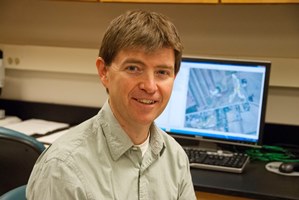 “It’s very rewarding to me when students make the connection from schoolwork to their own life,” said Dr. David Bowne, assistant professor of biology, about his original short story “Talking Turkey.”
“It’s very rewarding to me when students make the connection from schoolwork to their own life,” said Dr. David Bowne, assistant professor of biology, about his original short story “Talking Turkey.”
The fictional story, about a first-year college student who returns home for Thanksgiving break and announces to her parents that she is a vegetarian, was written to engage students in scientific topics.
At first, the student’s declaration doesn’t go over well with her family members, especially after she tells them she is not a vegetarian for animal welfare, but for ecological reasons. The story examines her explanation of the idea, which leads to a family discussion over their traditional turkey dinner.
It’s very rewarding to me when students make the connection from schoolwork to their own life.”
“Talking Turkey” is one of three stories Bowne has written as a teaching tool. This narrative, however, is the first to be published by Eco-Ed Digital Library, a peer reviewed online database of teaching material for ecological sciences. The biology professor finds that using these stories in his courses allows students to engage with scientific topics. “The idea is that, hopefully, the students will get engrossed with the story, relate to the characters and be interested in not only the fiction part but also in the science aspect,” said Bowne.
Bowne added that he has had great success with students being more interested in topics and helping them understand science by hooking them in with the story. He assigns the reading of the story as homework, in which students must participate in a Blackboard discussion. Bowne finds that students are more willing to discuss material through Blackboard than in the classroom.
“Seeing their comments and how they apply the material is really an indication their interested in it,” he said. “When students talk about topics when they don’t have to, I think it’s a sign that it is a pretty successful assignment.”
“Talking Turkey” is free and available to download.

